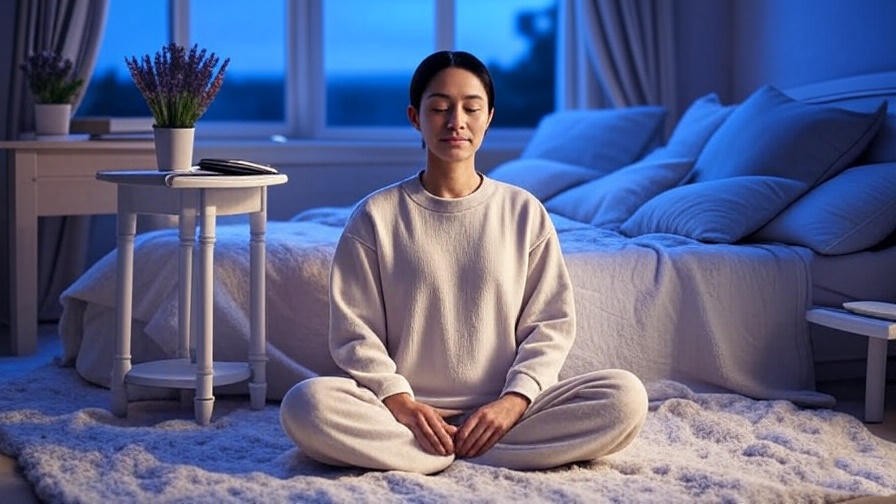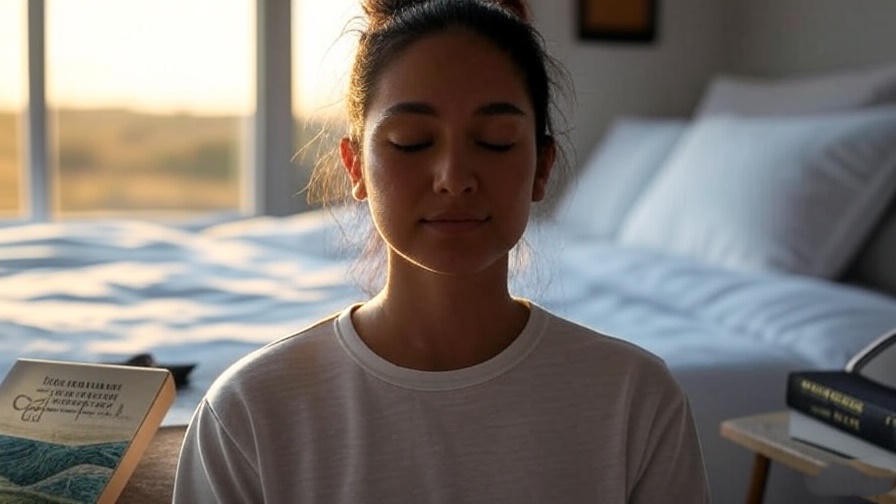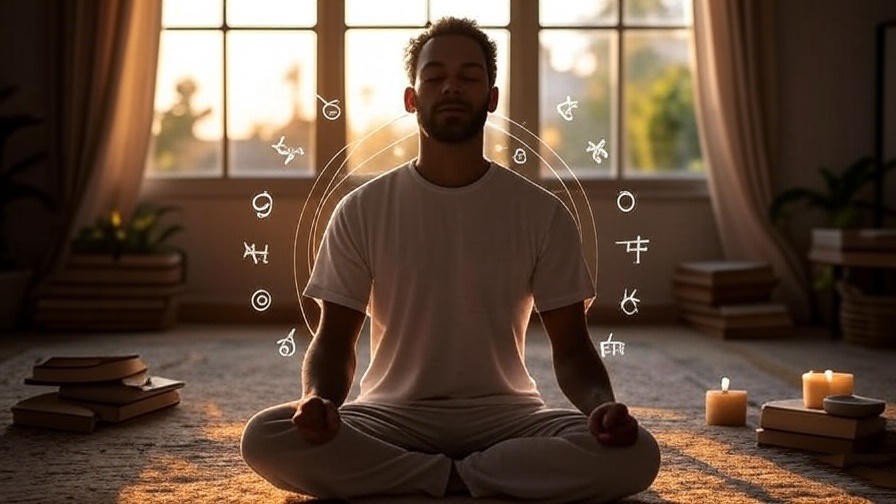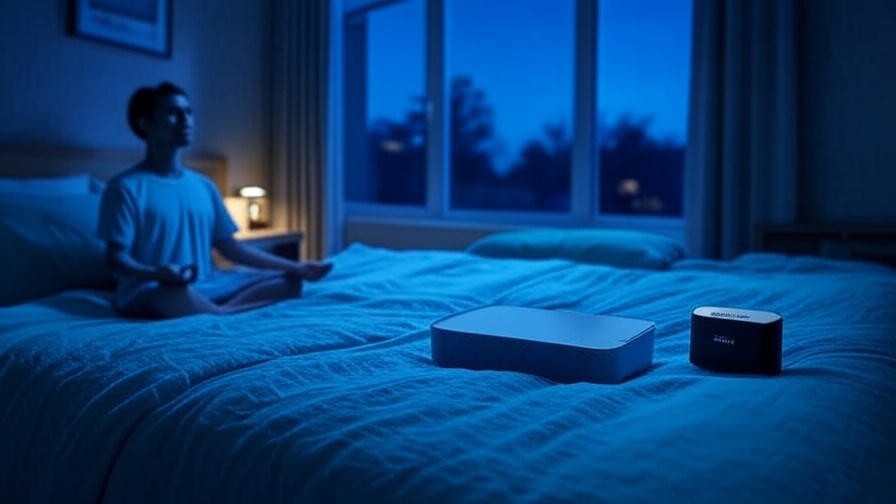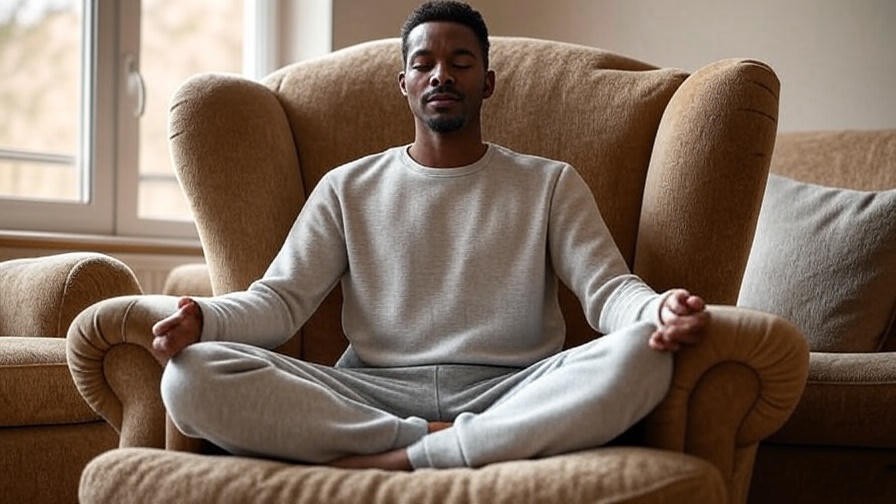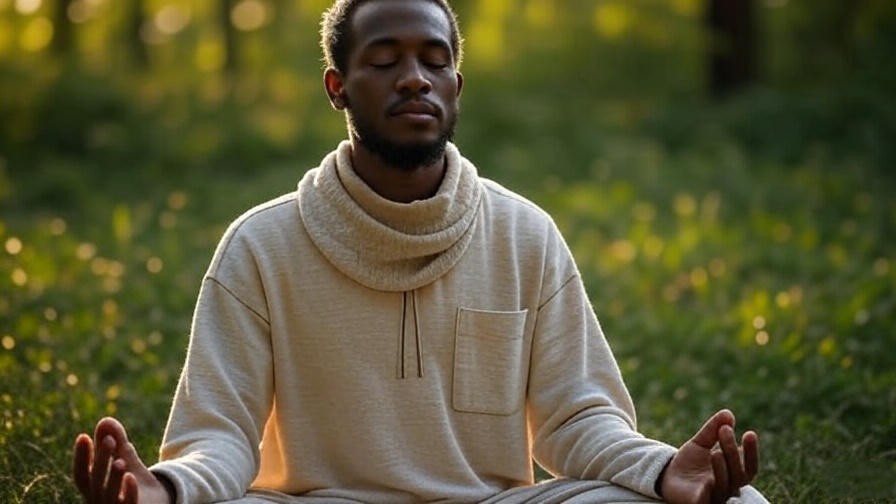Picture this: It’s 2 a.m., and you’re staring at the ceiling, your mind racing with tomorrow’s to-do list. Stress weighs heavy, and sleep feels like a distant dream. If this sounds familiar, you’re not alone—millions struggle with stress and sleeplessness in today’s fast-paced world. Enter meditation teachers, expert guides who can transform your chaotic mind into a haven of calm. In this comprehensive guide, we’ll explore how meditation teachers can help you achieve inner peace and improve your sleep, backed by science and real-life success stories. From personalized techniques to structured routines, you’ll discover practical steps to reclaim your well-being and restful nights.
Why Inner Peace and Better Sleep Matter
The Connection Between Stress, Sleep, and Well-Being
Chronic stress is a silent thief, robbing you of restful sleep and mental clarity. According to the American Psychological Association, 43% of adults report that stress negatively impacts their sleep. When stress hormones like cortisol spike, they disrupt your body’s natural sleep-wake cycle, leading to insomnia, fragmented sleep, or waking up exhausted. Meditation, however, rewires the brain for calm. A 2017 study in Neuroscience Letters found that mindfulness meditation reduces cortisol levels by 25%, promoting deeper REM sleep and emotional balance. Inner peace isn’t just a luxury—it’s the foundation of holistic well-being, enhancing happiness, focus, and resilience.
The Unique Role of Meditation Teachers
While apps and online courses offer meditation basics, meditation teachers bring expertise and personalization that apps can’t match. Certified instructors, often trained in programs like Mindfulness-Based Stress Reduction (MBSR), assess your unique stressors and goals to craft tailored practices. For example, Sarah, a 34-year-old nurse, struggled with anxiety-induced insomnia. Her meditation teacher introduced her to guided body scan meditation, which helped her fall asleep 30 minutes faster within two weeks. Teachers provide accountability, refine techniques, and deepen your practice, making them invaluable for sustainable stress relief and sleep improvement.
How Meditation Teachers Help You Achieve Inner Peace

Personalized Guidance for Your Unique Needs
Meditation isn’t one-size-fits-all. A skilled meditation teacher evaluates your lifestyle, stress triggers, and emotional needs to design a practice that works for you. For instance, if work-related anxiety keeps you awake, they might recommend mindfulness meditation to anchor your thoughts. If emotional overwhelm is the issue, loving-kindness meditation could foster self-compassion. “Personalization is key,” says Dr. Lisa Chen, a certified meditation instructor with 15 years of experience. “A teacher listens to your story and tailors techniques to address specific pain points, ensuring faster, lasting results.” This bespoke approach sets teachers apart, guiding you toward true inner calm.
Building a Consistent Meditation Practice
Consistency is the cornerstone of meditation’s benefits, but sticking to a routine can be challenging. Meditation teachers provide structure and motivation, helping you build a habit that lasts. They might suggest starting with just 5 minutes daily, gradually increasing to 20 minutes. Tips include creating a calming space—think dim lighting and a comfortable seat—and tracking progress with a journal. A 2020 study in Sleep Medicine found that consistent meditation improved sleep quality by 30% over eight weeks. Teachers hold you accountable, offering feedback and encouragement to keep you on track, even when life gets hectic.
Teaching Advanced Techniques for Deeper Relaxation
Meditation teachers introduce advanced techniques that go beyond basic breathing exercises. For example, body scan meditation systematically relaxes each muscle group, easing physical tension before bed. Loving-kindness meditation fosters positive emotions, reducing anxiety that disrupts sleep. Breathwork, like the 4-7-8 technique, slows the nervous system, signaling rest. “After learning body scan from my teacher, I felt like I was floating into sleep,” says Mark, a 40-year-old accountant. These techniques, taught with precision, amplify relaxation and pave the way for profound inner peace, making teachers essential for mastering meditation’s full potential.
How Meditation Teachers Improve Your Sleep
Addressing Common Sleep Challenges with Meditation
Sleep issues like insomnia, racing thoughts, or waking up tired plague many. Meditation teachers target these challenges with specific techniques. For insomnia, they might guide you through progressive muscle relaxation, which reduces physical tension. For a restless mind, mindfulness meditation helps you observe thoughts without judgment, quieting mental chatter. A 2015 JAMA Internal Medicine study found that mindfulness meditation improved insomnia symptoms by 50% in older adults. Teachers adapt these methods to your needs, ensuring you address the root causes of poor sleep with proven, science-backed solutions.
Creating a Pre-Sleep Meditation Routine
A structured pre-sleep routine can transform your nights. Meditation teachers often recommend a 10-minute practice to signal your body it’s time to rest. Here’s a sample routine: Start by dimming lights and sitting comfortably. Practice a gratitude meditation, reflecting on three things you’re thankful for. Follow with a guided sleep meditation, focusing on deep breathing and visualizing a serene place. Avoid screens 30 minutes prior to maintain melatonin production. “This routine changed my life,” says Emily, a teacher’s client who now sleeps soundly. Teachers provide scripts and guidance to make this routine second nature.
Long-Term Benefits for Sleep Quality

Working with a meditation teacher doesn’t just offer quick fixes—it builds lasting sleep improvements. Regular meditation enhances sleep architecture, increasing deep sleep and reducing sleep latency (the time it takes to fall asleep). A 2018 study in Behavioral Sleep Medicine showed that mindfulness meditation reduced sleep latency by 15 minutes after 12 weeks. Teachers ensure these benefits stick by refining your practice over time, addressing setbacks like stress spikes or travel disruptions. Their ongoing support helps you maintain restful, rejuvenating sleep, contributing to overall health and happiness.
Finding the Right Meditation Teacher for You
Qualities of an Effective Meditation Teacher
A great meditation teacher combines credentials, experience, and empathy. Look for certifications like MBSR, Yoga Alliance, or Transcendental Meditation training, which ensure rigorous training. Experience matters—teachers with 5+ years often have deeper insights into diverse needs. Empathy is crucial; a teacher should create a safe, nonjudgmental space. For example, Lisa, a busy mom, chose a teacher who listened to her parenting stress and tailored sessions accordingly. Use this checklist: Verify credentials, check reviews, assess teaching style, and ensure they specialize in stress or sleep-related meditation.
Where to Find Qualified Meditation Teachers

Finding a meditation teacher is easier than ever. Local wellness centers offer in-person classes, ideal for hands-on guidance. Online platforms like Insight Timer, Mindful.org, or Calm feature vetted teachers for virtual sessions, perfect for busy schedules. Community recommendations via social media groups can also lead to trusted instructors. Online sessions are often more affordable and flexible, though in-person offers deeper connection. Here’s a comparison:
| Platform | Cost | Features | Teacher Credentials |
|---|---|---|---|
| Insight Timer | $10-$50/session | Live and recorded sessions | Certified instructors |
| Mindful.org | $15-$60/session | Courses and one-on-one | MBSR-trained teachers |
| Local Centers | $20-$100/session | In-person, group options | Varies by center |
Choose based on your budget and preference for virtual or in-person learning.
Questions to Ask Before Choosing a Teacher
To find the right fit, ask these questions during a consultation:
- What meditation techniques do you specialize in?
- How do you address sleep-specific challenges?
- What’s your experience with beginners?
- Do you offer virtual or in-person sessions?
- How do you tailor practices to individual needs?
- Can I try a trial session?
- What’s your approach to building a consistent practice?
A trial session helps assess compatibility. “My teacher’s patience made all the difference,” says John, a beginner who found success after asking these questions.
Practical Steps to Start Working with a Meditation Teacher
Setting Clear Goals for Your Meditation Journey
Embarking on a meditation journey with a teacher starts with defining clear, achievable goals. Whether you aim to reduce anxiety, sleep seven hours consistently, or cultivate daily calm, specificity is key. Use the SMART framework: Specific, Measurable, Achievable, Relevant, and Time-bound. For example, “I want to meditate 10 minutes daily for 30 days to fall asleep faster” is a SMART goal. A meditation teacher can help refine these objectives, ensuring they align with your lifestyle. To get started, jot down your top three stress or sleep challenges and discuss them in your first session. A downloadable goal-setting worksheet can help you clarify your intentions, tracking progress like a roadmap to inner peace.
What to Expect in Your First Session
Your first session with a meditation teacher is an opportunity to build trust and set the foundation for your practice. Typically, it begins with a consultation to discuss your goals, challenges, and experience level. The teacher may guide you through a short meditation, such as a 5-minute mindfulness exercise focusing on breath awareness. Expect feedback on your posture, breathing, or mindset, tailored to your needs. Beginners often worry, “I can’t quiet my mind.” Teachers address this by normalizing wandering thoughts and offering techniques like anchoring attention to a mantra. Try this beginner-friendly exercise at home: Sit comfortably, close your eyes, and count five slow breaths, noticing the air moving through your nose. This simple practice, often introduced in first sessions, builds confidence.
Integrating Meditation into Your Daily Life

A meditation teacher helps you weave meditation seamlessly into your routine. Start with a 7-day plan: Dedicate 5-10 minutes each morning or evening, using a teacher’s guided audio if needed. Combine meditation with complementary practices like journaling (e.g., noting three things you’re grateful for) or gentle yoga to enhance relaxation. Time management is crucial—schedule sessions during low-stress periods, like before breakfast or after work. “My teacher suggested meditating right after my evening tea, and it became a habit,” says Priya, a 28-year-old designer. Teachers also recommend apps like Insight Timer for guided sessions between meetings, ensuring meditation becomes a natural part of your day.
Common Myths About Meditation and Teachers
Misconceptions about meditation can deter beginners, but meditation teachers help dispel these myths with expertise. Here are three common ones:
- Myth: Meditation is only for spiritual people. Reality: Meditation is a science-backed practice for anyone seeking stress relief or better sleep. A 2019 study in Frontiers in Immunology showed meditation reduces inflammation, benefiting even non-spiritual individuals.
- Myth: You don’t need a teacher to meditate. Reality: While solo practice works, teachers accelerate progress by correcting techniques and providing accountability. “My teacher’s feedback doubled my focus,” says Alex, a client.
- Myth: Meditation takes too long to work. Reality: Benefits can appear in as little as two weeks. A 2021 Journal of Clinical Sleep Medicine study found that 10-minute daily mindfulness improved sleep quality in 14 days.
Teachers guide you past these myths, ensuring a practical, results-driven practice.
Success Stories: Real-Life Transformations
Real-world examples highlight the power of meditation teachers. Take Maria, a 45-year-old teacher battling insomnia due to work stress. Her meditation teacher introduced a 15-minute body scan practice, helping her fall asleep 20 minutes faster within a month. “I went from dreading bedtime to loving it,” she says. Similarly, Raj, a 32-year-old entrepreneur, struggled with anxiety that disrupted his sleep. His teacher’s loving-kindness meditation fostered self-compassion, reducing nighttime worry. After three months, he reported sleeping eight hours consistently. These stories, grounded in real experiences, show how teachers tailor solutions to transform lives, offering hope and relatability to readers.
FAQs About Working with Meditation Teachers
How long does it take to see results from working with a meditation teacher?
Results vary, but many notice improvements within 2-4 weeks. A 2020 Sleep Medicine study showed that guided meditation reduced sleep latency by 12 minutes after 14 days. Consistency and teacher guidance accelerate progress.
Can meditation teachers help with specific sleep disorders like insomnia?
Yes, teachers trained in mindfulness or CBT-based meditation can address insomnia by targeting racing thoughts or physical tension. A 2015 JAMA study confirmed mindfulness meditation halved insomnia symptoms in older adults.
Are online meditation teachers as effective as in-person ones?
Online teachers are highly effective, offering flexibility and access to top instructors. In-person sessions may foster deeper connection, but both formats work well, depending on your preference.
How much does it cost to work with a meditation teacher?
Costs range from $10-$100 per session, depending on platform or location. Online platforms like Insight Timer offer affordable options, while in-person sessions may cost more. Check with providers for exact pricing.
What if I’m new to meditation and feel intimidated?
Teachers specialize in beginners, creating a judgment-free space. Start with short, guided sessions, and communicate your concerns—they’ll tailor the practice to ease you in comfortably.
Conclusion
Meditation teachers are your allies in navigating the stress and sleeplessness of modern life. With personalized techniques, structured routines, and expert guidance, they unlock the path to inner peace and restful sleep. From reducing cortisol to deepening sleep cycles, their impact is backed by science and real-world success. Take the first step today: research a certified teacher, try a trial session, or practice a simple 5-minute meditation. Your journey to calm and rejuvenating sleep starts now. Share your experiences in the comments or explore our related articles on creating a sleep sanctuary or mastering mindfulness for beginners.


